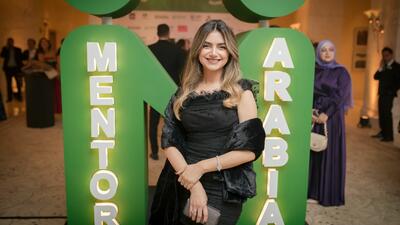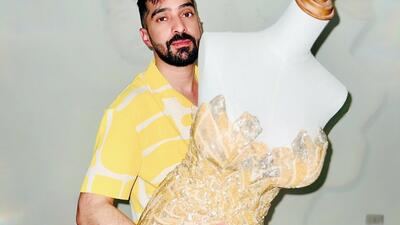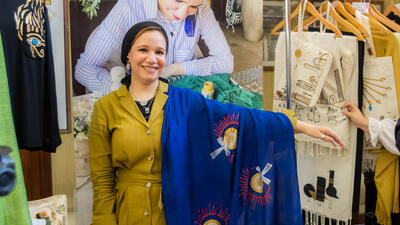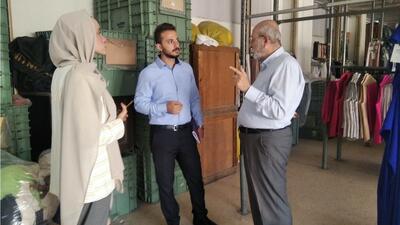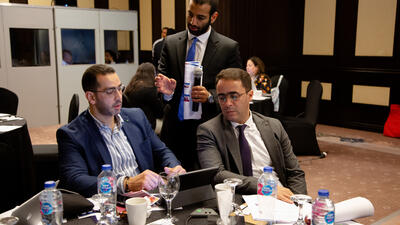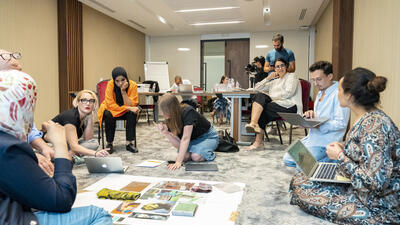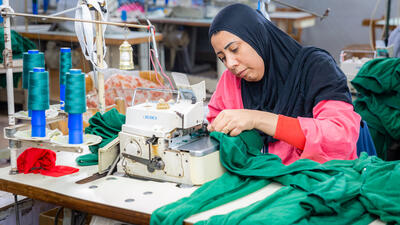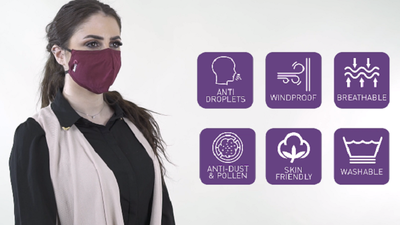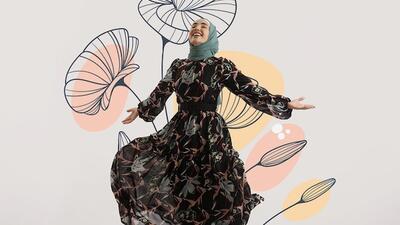
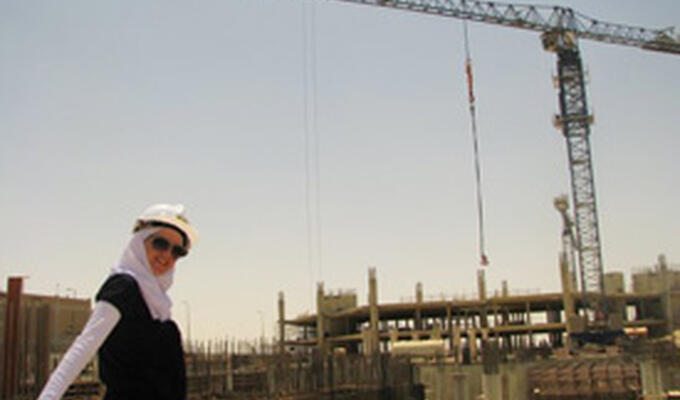
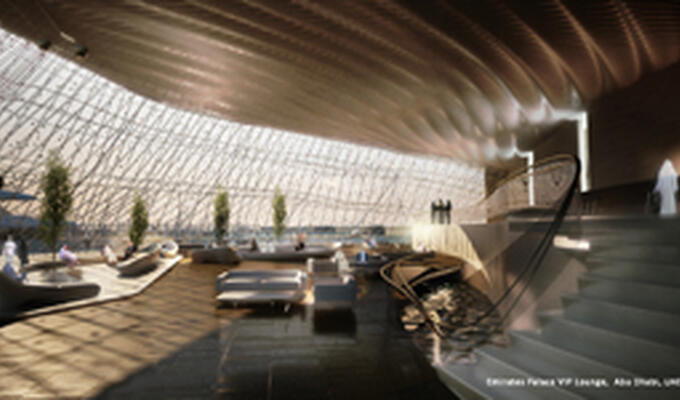
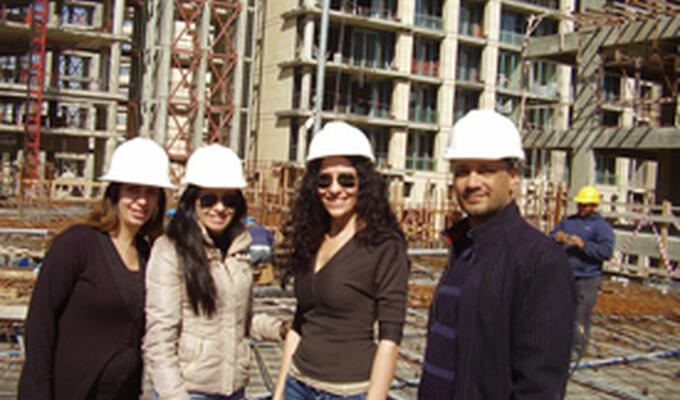
Women in construction: Q&A - New concepts in traditional contexts
In December 2011 in London, Jordanian firm Maisam Architects and Engineers was recognized with eight prestigious Arabian Property Awards for work spanning residential, public sector and commercial architecture. What is remarkable about this 50-person firm, other than its haul of trophies, is that its founder and more than half its staff are women — in a field and culture where professional women are certainly in the minority.
The founder and figurehead of Maisam, Meisa Batayneh, is anything but typical. Born in Taipei, daughter of Jordan’s ambassador to China, Batayneh was named by Madame Chiang Kai-shek herself (Meisa is a nickname for her given name, Mei-Ling). From age 10 she lived in Jordan, and then followed her brother to the United States, where she studied architecture at the University of Texas.
Today, not only is she an accomplished architect running a highly successful firm in Amman, she also sits on several boards, is a past president of Business and Professional Women (BPW) for Jordan, served as a jury member for the rehabilitation of Fez, Morocco, and is an adviser to the Jordanian Ministry of Environment, to name a few of her endeavours.
International Trade Forum spoke with Batayneh to learn about her professional path, and to gain her perspective on opportunities for women in business — in Jordan and across the Arab world.
Trade Forum: What originally led you to architecture?
Meisa Batayneh: I come from a family of six children, all of whom are extremely creative in one way or another. I can’t explain it, but I wonder whether China had anything to do with it. When I was a girl in Taipei, I studied in an American Catholic school, and later at a Dominican school. At the same time, life at home was extremely Arabian.
Later, because of my experiences in the Far East and because I come from the Middle East, I felt I had layers in my subconscious that led me to excel in architecture. I realized I knew more about the mission of architects because of my exposure to different parts of the world.
TF: How did that awareness emerge?
Batayneh: I always had an instinct for style, and as a young girl I became the family member who was consulted on everything having to do with taste. I remember my mother, an ambassador’s wife, practicing ikebana [Japanese flower arranging], and I was always part of her creativity involved in entertaining.
So when I enrolled at the University of Texas, following my brother who was studying there, I chose interior architecture. While I was still a first-year student, Anthony Antoniades, a prominent architect who was a professor at the university, noticed my work and told me to switch programmes because I had talent as an architect. That was a significant milestone. Another was when Charles Jencks, a renowned architectural theorist and landscape designer, juried a national competition in America that I won, at the age of 20. I did not expect that — it blew my mind.
Partly because of that award, I was hired by the top architectural firm on my return to Jordan. I had much to learn, because I needed to understand how to design in the Arab world. I was Arabian, but I did not understand the materials, construction methods and so on. Five years later I felt I had nothing more to contribute or gain, so I started my own firm. I promised myself that I would create a working environment where people would always have a smile on their face.
TF: What has been the secret of your success?
Batayneh: I grew up in a male-dominated family, and my father believed women need to be educated — more than men — and should never leave the workforce. He believed women should be self-sustaining. The way he put it was, because he is an army man, ‘Your work is your armament. If anyone takes it from you, they are taking your sword.’ I also married into a family that believed women should work. My mother-in-law was a successful business woman and a senator many times over.
What worked for me was my character — I am very assertive. If I want the moon, it comes down. I don’t get what I want through anger, or by being obstinate, but through good energy and hard work.
TF: What barriers have you encountered?
Batayneh: Throughout the world, the most successful architects are men. This is in part because the job is very demanding and requires long hours. There are times I go home at five o’clock in the morning. So the architecture profession itself is a barrier.
Second, when I went to university, they didn’t tell me I would have to be a business person in addition to being an architect. I had to learn the business dimension the hard way — branding, marketing, financial management — and it was a struggle.
Third, living in a turbulent part of the world, the variables are changing all the time. You wake up one day and the rules have changed. It forces you to adapt and continually revisit your strategic objectives and performance indicators.
TF: Your story is quite unique. What challenges do you see other women are facing?
Batayneh: Education is not the issue in Jordan: 87% of Jordanian women are educated and 55% graduate from university. The real problem is participation — only 14.9% of women are in the workforce. This represents huge untapped potential. My fear, and I am very vocal about this, is that if we don’t get a return on investment, why educate women at all? Of course as a society we believe that educating women is important as an end goal. But what people do with their education, this we have not solved.
Expectations around fertility and marriage are a barrier, with the persistence of stereotypes and traditional roles of women. And among those women who do work, we see a strong tendency to go into the health, education and manufacturing sectors. With three quarters of working women entering these three sectors, there is naturally more competition for positions and less opportunity.
A final barrier is the lack of acceptable public transportation. Women cannot commute to work, respectably, with the transportation system we have. A dependable and well-functioning bus system, which does not exist, would allow women to get to their place of employment for a reasonable cost and under reasonable conditions.
TF: What else could be done to enable more women to participate in the formal economy?
Batayneh: I always try to look past the cultural norms to practical solutions that could overcome the barrier. When I became president of BPW in Jordan, I looked at making use of information technology to benefit professional women. I lobbied for the At Home initiative, avoiding all of the barriers I have been mentioning. I created a detailed model that can enable consultants — both men and women — to work from home. This work influenced a provisional law permitting women consultants — legal consultants, architects, engineers, translators — to practice out of their home. We attracted USAID funding for the project and it is currently in the testing phase.
An important benefit of this is to help women to stay connected to the workplace while they are raising their children. This programme helps to remove the fear that can develop from being away from a working environment for several years. Women in their 40s so often end up depressed, wondering what they have accomplished aside from raising their children.
I led another initiative called Closer to Home. This came from the realization that the most successful call-centre operators are women. In every tribe or neighbourhood, there are community houses where people used to meet to exchange ideas, hold weddings or solve problems. Today, as the country has developed, these places have lost their function and meaning, and have become simply a place where people hang out. My idea was to switch them into call centres where women can work. These locations are inside the community, near people’s homes, and in a situation that husbands and fathers would be comfortable with.
These models don’t fight against culture, but work within the cultural framework. We should encourage and celebrate what works within our culture — the community, the village, the one nest.
TF: What motivates you to keep working so hard?
Batayneh: What motivates me is humanity at large. We need to start regaining hope and trust. I feel I have to play a role in creating a better world, for us and our children. My worry is that the Arab region is becoming more polarized than ever, with some people becoming more conservative and religious, and others fighting for more liberty and personal freedoms. So there’s more at stake today than ever, and we need to be vigilant and alert.
On another level, I have a team of 50 people in my company who have daily work — their collective enthusiasm and creativity is my main motivator. I created a flat organization where everyone has a chance to grow and eventually become a partner, because I plan for the company to become employee-owned.
I’m continually renewing myself. I’m surrounded by young people, and through them I’m energized. I’ve never stopped working and I enjoy knowing that nothing can stop me. I don’t get discouraged easily, and that comes from working all my life, making mistakes and seeing the results and the success. I did suffer and lose track at times. But now I am happily married, I love my children, and I’m surrounded by beautiful people and friends.
All projects were undertaken and have © with Maisam Architects and Engineers, Jordan.





